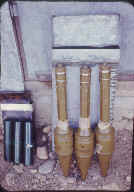There are many aspects of SF camp life to explain. I will tell you about many of them.
Some you may find hard to believe; some you won't want
to believe. But they are all part of the "SF Vietnam experience".
A-team food: Adventures in dining!
A-Teams were... "remote"
How remote, you ask? So remote, I reply, that Special Forces A-Team members received RNA -- Rations Not Available. That may not seem like a big deal, but consider this: In return for $70 per month the Army had no obligation to feed you. This meant that an A-Team had no regular food supply!
Food 'patrols'
It was a tacit A-Team policy, therefore, to rotate the men back to Headquarters on food-foraging 'patrols'. (I call them 'patrols', since 'raids' has such a negative connotation.) So, at any given time, the twelve-man team had ten men on-site and two at Da Nang (Company C) headquarters. The mission of the men at Da Nang included: get some rest, visit dispensary (as needed), and get food. What we had available to eat at camp depended entirely on the success of the men returning from Da Nang. Our usual methods of obtaining food were to: a) buy it; b) trade captured weapons for it; and c) steal it. None of us liked the idea of buying the food, so that avenue was seldom used.
Let's make a deal... Vietnam style
I have not seen it in writing anywhere, so let me be the first to state that Viet Nam had one of the largest 'blackmarkets' in history. We were able to trade captured weapons for food, simply because there were many soldiers who were 'wheelin' and dealin'. It was through this blackmarket activity that some soldiers were able to generate large sums of money.

Captured Weapons
Although seldom used as trading material, these Chinese BA-40 rockets were typical of the weapons captured by Special Forces. More often than
not, NVA and VC rifles captured by A-team personnel during firefights were used to trade for food for the camp. Crossbows, handmade by the 'Yards, were another favorite trading
medium. These captured weapons were then frequently sold by the trader to non-combat personnel... REMFs.
Payment was in MPC -- Military Payment
Certificate. (It was illegal to have US dollars in Viet Nam.) This left the 'trader' in an awkward position. He had generated a large sum of
money that was absolutely worthless outside of Viet Nam. What was a poor soldier to do? These men, through their connnections, would find out
who was headed 'out-of-country'. Since soldiers leaving the country (on R & R, for example) were authorized to trade MPC for US dollars,
these traders would ask/pay/bribe men to 'cash-in' MPC for them. Being the naive person I was, I saw no problem helping out a soldier by
cashing in $2000 worth of MPC... on two separate occasions. Later, I heard that this cook had successfully traded for a Huey chopper. How...
I ask you "How?!?"... did he expect to get THAT out of Vietnam??
Let's make a meal... Vietnam style
In most cases our attempts at foraging for food met with both success and failure simultaneously. Seldom did our teammates return empty-handed. We were quite good at bulk pilferage. Many times acting like you had the authority to do something was sufficient to get away with it. I would be curious to know how many times SF personnel pulled up to pallets of commodities at the airbase, loaded them, and simply drove off with the material. Beer? No problem. The selection was extremely limited (one brand!), but a whole pallet at a time would find its way onto the C-123 or CV-2 Caribou headed for the SF camp.
One of our 'food patrols' was exceptionally successful: they spirited away a whole pallet of steaks. Unfortunately, this was all they got. All we had to eat was steak -- breakfast, lunch, and dinner. We grilled it. We fried it. We baked it. Have you ever tried boiled steak?? THAT was disgusting! I guess you could call eating at the A-Team "Adventures in Dining!" Few people outside of SF know that the Army made no provisions to feed us.
